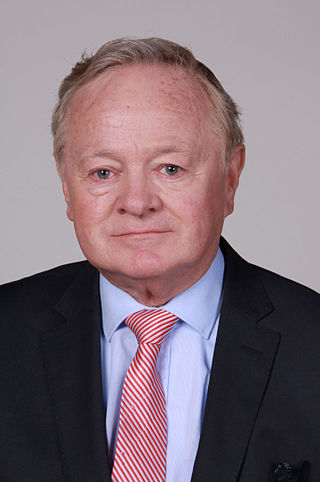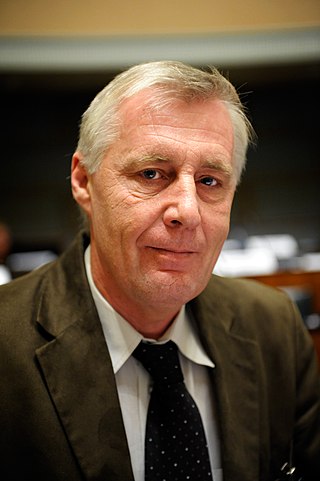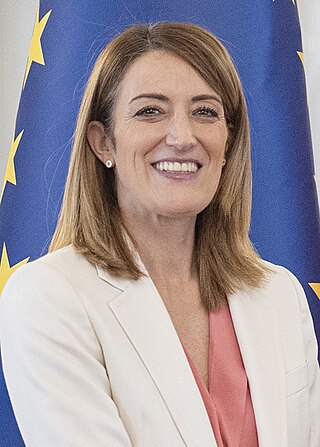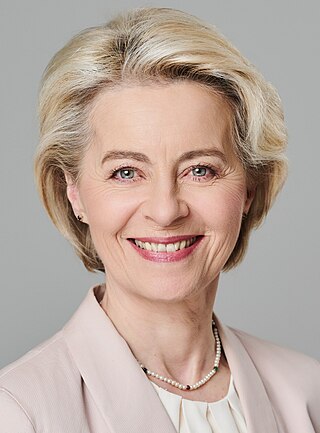Related Research Articles

The European Parliament (EP) is one of the two legislative bodies of the European Union and one of its seven institutions. Together with the Council of the European Union, it adopts European legislation, following a proposal by the European Commission. The Parliament is composed of 720 members (MEPs), after the June 2024 European elections, from a previous 705 MEPs. It represents the second-largest democratic electorate in the world, with an electorate of around 375 million eligible voters in 2024.

The president of the European Commission, also known as president of the College of Commissioners or prime commissioner, is the head of the European Commission, the executive branch of the European Union (EU). The president of the commission leads a cabinet of commissioners, referred to as the college. The president is empowered to allocate portfolios among, reshuffle, or dismiss commissioners as necessary. The college directs the commission's civil service, sets the policy agenda and determines the legislative proposals it produces. The commission is the only body that can propose, or draft, bills to become EU laws.

A member of the European Parliament (MEP) is a person who has been elected to serve as a popular representative in the European Parliament.

Jerzy Karol Buzek is a Polish politician and former Member of the European Parliament from Poland. He has served as Prime Minister of Poland from 1997 to 2001, since being elected to the European Parliament in 2004, he served as President of the European Parliament between 2009 and 2012. He is married to Ludgarda Buzek and is the father of Polish actress Agata Buzek.

Janusz Antoni Lewandowski is a Polish politician and economist belonging to the Gdańsk liberals group, and a former member of the European Parliament, Chairman of the Committee on Budgets. On 27 November 2009 he obtained the post of Budget and Financial Programming Commissioner of the European Commission and is affiliated to the European People's Party (EPP). He was re-elected for the 8th term (2014–2019) of the European Parliament, as a member of the EPP group.

The president of the European Parliament presides over the debates and activities of the European Parliament. They also represent the Parliament within the European Union (EU) and internationally. The president's signature is required for laws initiated under co-decision and the EU budget.

Pierre Moscovici is a French politician who served as the European Commissioner for Economic and Financial Affairs, Taxation and Customs from 2014 to 2019. He previously served as Minister of Finance from 2012 to 2014 and as Minister for European Affairs between 1997 and 2002.

Jim Higgins is an Irish former Fine Gael politician. He served as a member of Seanad Éireann, Dáil Éireann, and was a European People's Party Member of the European Parliament for the North-West constituency from 2004 to 2014.

Henrik Dam Kristensen is a Danish politician and a former speaker of the Danish parliament. He has been a member of the Danish parliament for the Social Democrats from 1990 to 2004 and again from 2007, during which he served as Minister for Agriculture and Fisheries (1994–1996), Minister for Food (1996–2000), Minister for Social Affairs (2000–2001), Minister for Transport (2011–2013) and Minister for Employment (2014–2015). He served as President of the Nordic Council in 2011 and 2016.

Udo Bullmann is a German politician who has been serving as a member of the European Parliament since 1999. He is a member of the Social Democratic Party of Germany (SPD), part of the Party of European Socialists. He has been re-elected to serve as a member until 2029.

There are fourteen vice-presidents of the European Parliament who sit in for the president in presiding over the plenary of the European Parliament.

David James McAllister is a German politician who has been a member of the European Parliament since 2014. He is a member of the Christian Democratic Union, part of the European People's Party. He is the current Vice President of the European People's Party and he is also Vice Chairman of the International Democrat Union. He was appointed Chair of the European Parliament Foreign Affairs Committee in February 2017.

Roberta Metsola is a Maltese politician who has served as the president of the European Parliament since January 2022. She is a member of Malta's Nationalist Party (PN) and the European People's Party (EPP).

Morten Løkkegaard is a Danish politician who has served as a Member of the European Parliament (MEP) and the Danish Parliament intermittently since 2009. He has held his current position as a member of the European Parliament since 2016. He represents the Venstre political party and is affiliated with the Alliance of Liberals and Democrats for Europe.

Malik Azmani is a Dutch politician and former lawyer and civil servant. A member of the People's Party for Freedom and Democracy (VVD), which he led in the 2019 European Parliament election, he has served as a Member of the European Parliament (MEP) since then. Azmani was first elected to the House of Representatives in 2010.

Tomas Gunnar Tobé is a Swedish politician who serves as a Member of the European Parliament since the 2019 European Parliament election in Sweden.

Renew Europe (Renew) is a liberal, pro-European political group of the European Parliament founded for the ninth European Parliament term. The group is the successor to the Alliance of Liberals and Democrats for Europe (ALDE) group which existed during the sixth, seventh and eighth terms from 2004 to 2019, and under a variety of other names in earlier Parliaments. Renew Europe in the European Committee of the Regions is the sister group of Renew Europe.

The 2024 European Parliament election was held in the European Union (EU) between 6 and 9 June 2024. It was the tenth parliamentary election since the first direct elections in 1979, and the first European Parliament election after Brexit. A total of 720 Members of the European Parliament (MEPs) were elected to represent more than 450 million people from 27 member states. This election also coincided with a number of other elections in some European Union member states.